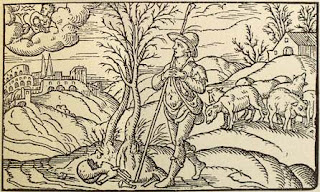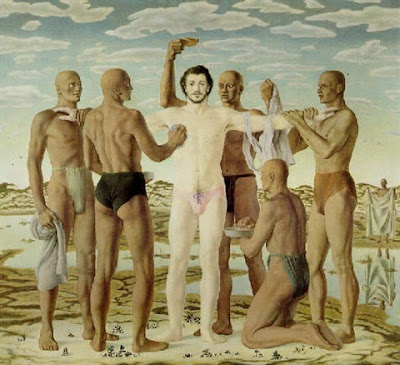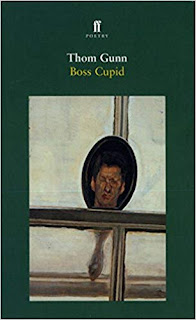Theories and Apparitions, Mark Doty.

In 2001, the novelist Colm Toibin published Love in a Dark Time, a series of critical essays on homosexuality, one of which discussed the poetry of Mark Doty. To be precise, “The Search for Redemption” focused on the poetry from 1993-1996: Toibin shows no awareness of the poetry from 1987-1991, presumably because this was not written for a gay Muse. With only My Alexandria and Atlantis in front of him, Toibin sets out analyse the faults and successes of Doty’s work. Toibin’s short essay (some nine pages) is significant because it represents an early reading of Doty’s work. It is also has curiousity value because it shows two very different minds at work. Over the years, Toibin has deliberately adopted an ambivalent attitude towards his gay identity: not surprising that his finest novel, The Master, should centre on Henry James. Doty—amongst contemporary gay poets— has a sure sense of his gay identity, as a man, as a poet, as a visionary. What worries Toibin mostly, in his essay, is Doty’s (supposed) lack of precision with language, with the exact word. The resultant essay is rather like Henry James, the master of nuance, worrying over what he believes to be Oscar Wilde’s camp and too easy emotional language. It is a strange affair, since Toibin is awkwardly unaware of Doty’s scrupulous attention to sensual detail.
In “The Search for Redemption,” Toibin reads Doty’s poetry in the context of his prose: not an admirable starting point for criticising poetry! Beginning with “Demolition” (p.1), then jumping to the centre of My Alexandria, with “The Wings” (pp.39-51), Toibin hears a “clotted” Lowell and a satiated poetry. That disparaging “clotted” reveals quite a lot, suggesting a thick creamy language which does not flow. Conversely, Toibin finds the music of Atlantis to be too runny and the emotions too “slack”. Toibin picks out six poems which all contain the phrase “I love.” He struggles with the simple, emotional intensity of Doty’s line.
Toibin’s reading of Doty is an excellent example of low-brow journalism masquerading as high-brow criticism. Yes, Doty confesses to Lowellisms in My Alexandria (and Toibin is quick to follow an authorial signpost), but there is hi-tec precision in “Difference” and language is peeled to a sliver in “No”. And Atlantis can hardly be judged on a few lines. What Toibin’s essay really shows is the inability of a prose writer to read poetry; so much so that he has to rely on Doty’s autobiographical prose work to give him basic factual clues to an art that in Doty’s hands in neither basic nor factual. “Redemption” is entirely the wrong word for Doty’s earlier work. It comes with over-tones of sin and being delivered from evil. Doty is a transcendental poet, one who is unafraid (like Whitman) to hear and see the metaphysical arise in the human body.
Toibin’s treatment of Doty, unfortunately, is reminiscent of the criticism (offered by UK critics) towards Gunn. Atlantis is Doty’s middle work, like Gunn’s Jack Straw's Castle, which was viewed as a falling-off, a loosening of sentiments and technique…and too proud of its gayness to be wholesome! It has taken astute critics such as Gregory Woods to show that Gunn’s work is part of a progression; and the same can be said of Doty’s work.
Mark Doty’s latest volume, Theories and Apparitions (2008), maintains the quality of writing that has gone before, but there are new tonalities. It is a fine collection of controlled poems. Many of the poems balance line control with flowing narratives that naturally meander like rivers. Doty is wary of a kind of poetry that gets from A to B too quickly, equally suspicious of a poetry that goes nowhere and drowns in a welter of unmoving images. Running through the volume is a light-filled and light-hearted hermeticism which questions and upholds language. Recent reviews of Theories and Apparitions have used words like “sound-bite” and “colloquial” to characterise the poetry. Both descriptions undervalue the quality of Mark Doty’s writing: “sound-bite” should be replaced with hi-definition and “colloquial” with plainspeaking.
The opening poem, in Theories and Apparitions, begins—uncharacteristically—in a very English setting. One night, near Hoarwithy, Hertforshire, Doty is presented with the music of a pipistrelle bat. Aware that the word “pipistrelle” means “evening” such that the name of the bat is literally born from darkness, the bat becomes a cipher for the birth of a poem. Two different responses are sinuously woven within the poem, one is English and Wordsworthian, another is American and Whitmanesque. Doty identifies his response as born out of Whitman: he attaches an ambassadorial function to the bat, that of a “quick” hermetical messenger, who possesses a voice that only Doty hears, which marks him out, like a visionary, for an epiphany within nature, within the nature of language:
“Does the poem reside in experience
or in self-consciousness
about experience?”
Poetry isn’t just about listening to a poet relate experience. It is about listening to something magical on the borderland where language stirs in relation to self:
“A word in your ear, says the night.”
The ability, like a hermeticist, to cross from the physical into the metaphysical, without losing the thread (and the reader in the process) is one of Mark Doty’s many skills.
The first poem is an honest opening to the whole of Theories and Apparitions. It introduces the psychic element within the volume. It opens the double pathways: theory and the testing of artistic experience: apparition and the observing of spectral encounters. The "Apparition" poems, arranged throughout the volume, work almost as crescendos within the whole music. The first of these, “Apparition (Favourite poem)” is a crisp poem about the efficacy of language, one in which an exact and detailed human voice speaks. It moves from a reverberating, mystical opening—“dust and sleep, burning so slowly”— into a sharp memory of a young Texan man reading Shelley. The speaker becomes a “vessel” for Shelley’s voice without losing his own, just as Doty relives the experience of the boy’s voice without losing his own. How the Word endures in the world is reflected upon with accuracy and emotion. The third “Apparition” is an encounter with Whitman. This isn’t Ginsberg’s outrageous Whitman seen in “A Supermarket in California”, a poet made in the image of Ginsberg, or Lorca’s heroic Whitman, “Adam-blooded”, fighting foul sensuality in the bull-ring of New York, but a poet in his 30s, with “warm lines around the eyes/dilated as by an opiate”, a softer Whitman than the visionary in Doty’s “A letter to Walt Whitman”, Source (2001). Within the medium of the poem, Doty creates a middle-aged, mediatorial Whitman, who is, but “isn’t the man I know”, whose quality of vision (in a poem all about seeing) shares the quality of Doty’s verse. This is a beautifully imagined poem about tradition and the continuity of feeling. The other poets who occur as apparitions include Berryman, Dugan, and a rather showy Hom(m)er in the guise of an “archaic” peacock!
Theories and Apparitions is a wonderful collection of poems. Doty--thankfully-- isn’t (Pound’s) Homer with an “ear, ear for the sea-surge” and what is epic in life. Rather, like the pipistrelle, he demonstrates an acute ear for words and their echoes within the dark human psyche. Unlike Wilde, who worshipped the elaborate peacock feather, which came to stand for his theory of Beauty, Mark Doty's rejection of the-peacock's tail-approach-to-poetry is a rejection of excess and redundancy. In his world, there is only the cauda pavonis of Blakeian hermeticism and a recognition that every little thing matters or nothing matters at all: poetry resides in the connections between everday actions and how language graces them. This is a volume characterised by its attentiveness to narrative, its distinctions in feeling and its evocative use of imagery.
In “The Search for Redemption,” Toibin reads Doty’s poetry in the context of his prose: not an admirable starting point for criticising poetry! Beginning with “Demolition” (p.1), then jumping to the centre of My Alexandria, with “The Wings” (pp.39-51), Toibin hears a “clotted” Lowell and a satiated poetry. That disparaging “clotted” reveals quite a lot, suggesting a thick creamy language which does not flow. Conversely, Toibin finds the music of Atlantis to be too runny and the emotions too “slack”. Toibin picks out six poems which all contain the phrase “I love.” He struggles with the simple, emotional intensity of Doty’s line.
Toibin’s reading of Doty is an excellent example of low-brow journalism masquerading as high-brow criticism. Yes, Doty confesses to Lowellisms in My Alexandria (and Toibin is quick to follow an authorial signpost), but there is hi-tec precision in “Difference” and language is peeled to a sliver in “No”. And Atlantis can hardly be judged on a few lines. What Toibin’s essay really shows is the inability of a prose writer to read poetry; so much so that he has to rely on Doty’s autobiographical prose work to give him basic factual clues to an art that in Doty’s hands in neither basic nor factual. “Redemption” is entirely the wrong word for Doty’s earlier work. It comes with over-tones of sin and being delivered from evil. Doty is a transcendental poet, one who is unafraid (like Whitman) to hear and see the metaphysical arise in the human body.
Toibin’s treatment of Doty, unfortunately, is reminiscent of the criticism (offered by UK critics) towards Gunn. Atlantis is Doty’s middle work, like Gunn’s Jack Straw's Castle, which was viewed as a falling-off, a loosening of sentiments and technique…and too proud of its gayness to be wholesome! It has taken astute critics such as Gregory Woods to show that Gunn’s work is part of a progression; and the same can be said of Doty’s work.
Mark Doty’s latest volume, Theories and Apparitions (2008), maintains the quality of writing that has gone before, but there are new tonalities. It is a fine collection of controlled poems. Many of the poems balance line control with flowing narratives that naturally meander like rivers. Doty is wary of a kind of poetry that gets from A to B too quickly, equally suspicious of a poetry that goes nowhere and drowns in a welter of unmoving images. Running through the volume is a light-filled and light-hearted hermeticism which questions and upholds language. Recent reviews of Theories and Apparitions have used words like “sound-bite” and “colloquial” to characterise the poetry. Both descriptions undervalue the quality of Mark Doty’s writing: “sound-bite” should be replaced with hi-definition and “colloquial” with plainspeaking.
The opening poem, in Theories and Apparitions, begins—uncharacteristically—in a very English setting. One night, near Hoarwithy, Hertforshire, Doty is presented with the music of a pipistrelle bat. Aware that the word “pipistrelle” means “evening” such that the name of the bat is literally born from darkness, the bat becomes a cipher for the birth of a poem. Two different responses are sinuously woven within the poem, one is English and Wordsworthian, another is American and Whitmanesque. Doty identifies his response as born out of Whitman: he attaches an ambassadorial function to the bat, that of a “quick” hermetical messenger, who possesses a voice that only Doty hears, which marks him out, like a visionary, for an epiphany within nature, within the nature of language:
“Does the poem reside in experience
or in self-consciousness
about experience?”
Poetry isn’t just about listening to a poet relate experience. It is about listening to something magical on the borderland where language stirs in relation to self:
“A word in your ear, says the night.”
The ability, like a hermeticist, to cross from the physical into the metaphysical, without losing the thread (and the reader in the process) is one of Mark Doty’s many skills.
The first poem is an honest opening to the whole of Theories and Apparitions. It introduces the psychic element within the volume. It opens the double pathways: theory and the testing of artistic experience: apparition and the observing of spectral encounters. The "Apparition" poems, arranged throughout the volume, work almost as crescendos within the whole music. The first of these, “Apparition (Favourite poem)” is a crisp poem about the efficacy of language, one in which an exact and detailed human voice speaks. It moves from a reverberating, mystical opening—“dust and sleep, burning so slowly”— into a sharp memory of a young Texan man reading Shelley. The speaker becomes a “vessel” for Shelley’s voice without losing his own, just as Doty relives the experience of the boy’s voice without losing his own. How the Word endures in the world is reflected upon with accuracy and emotion. The third “Apparition” is an encounter with Whitman. This isn’t Ginsberg’s outrageous Whitman seen in “A Supermarket in California”, a poet made in the image of Ginsberg, or Lorca’s heroic Whitman, “Adam-blooded”, fighting foul sensuality in the bull-ring of New York, but a poet in his 30s, with “warm lines around the eyes/dilated as by an opiate”, a softer Whitman than the visionary in Doty’s “A letter to Walt Whitman”, Source (2001). Within the medium of the poem, Doty creates a middle-aged, mediatorial Whitman, who is, but “isn’t the man I know”, whose quality of vision (in a poem all about seeing) shares the quality of Doty’s verse. This is a beautifully imagined poem about tradition and the continuity of feeling. The other poets who occur as apparitions include Berryman, Dugan, and a rather showy Hom(m)er in the guise of an “archaic” peacock!
Theories and Apparitions is a wonderful collection of poems. Doty--thankfully-- isn’t (Pound’s) Homer with an “ear, ear for the sea-surge” and what is epic in life. Rather, like the pipistrelle, he demonstrates an acute ear for words and their echoes within the dark human psyche. Unlike Wilde, who worshipped the elaborate peacock feather, which came to stand for his theory of Beauty, Mark Doty's rejection of the-peacock's tail-approach-to-poetry is a rejection of excess and redundancy. In his world, there is only the cauda pavonis of Blakeian hermeticism and a recognition that every little thing matters or nothing matters at all: poetry resides in the connections between everday actions and how language graces them. This is a volume characterised by its attentiveness to narrative, its distinctions in feeling and its evocative use of imagery.



Comments